Griffin The
publication
Liberal Arts & Social Sciences College of
Department of Political Science and Public Administration
Spring 2020
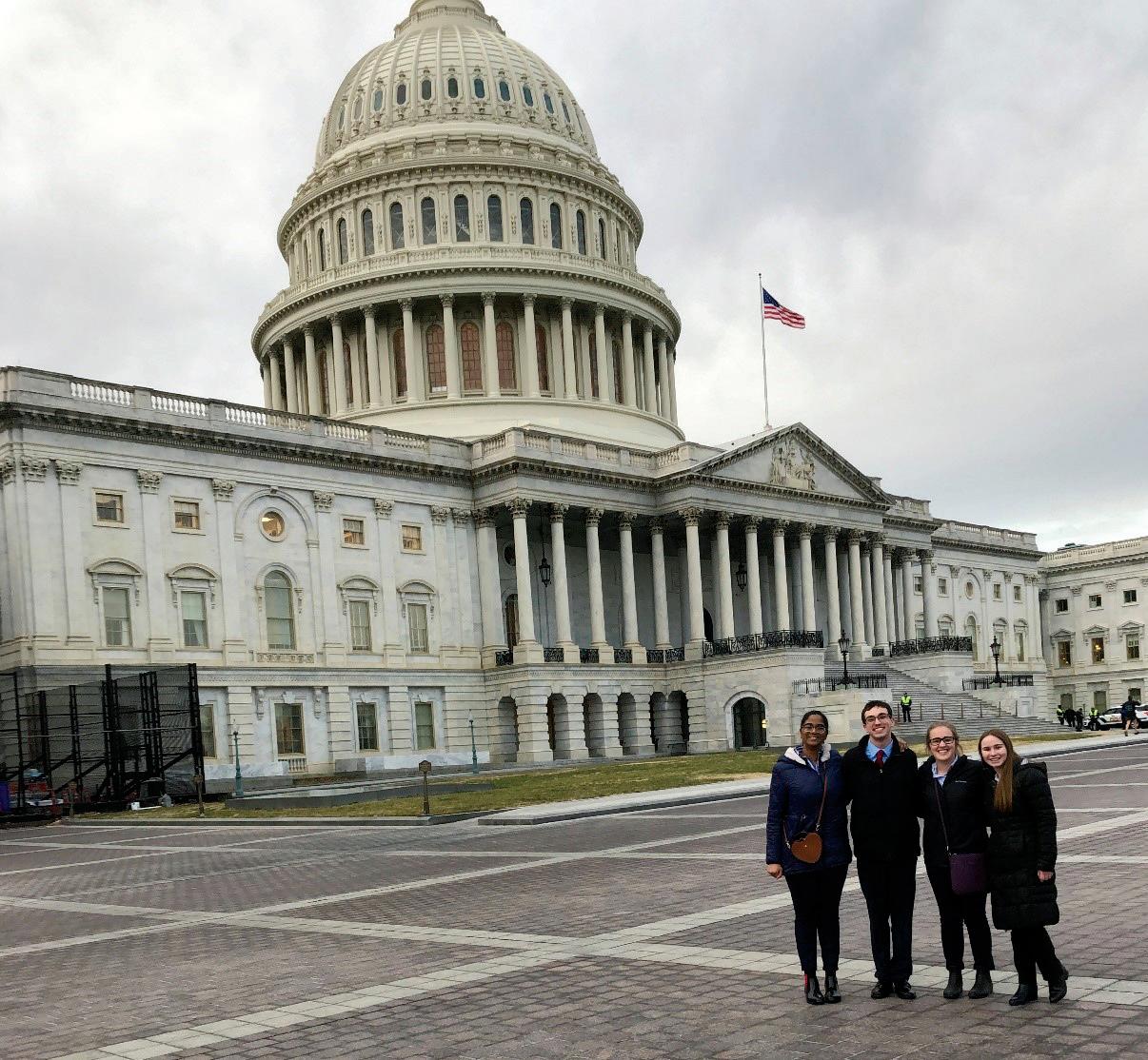 A
for the Robert P. and Marjorie Griffin Endowed Chair in American Government
CMU students visited Washington D.C. in January for two weeks of intensive academic study at the Washington Center for Internships and Academic Seminars (TWC).
A
for the Robert P. and Marjorie Griffin Endowed Chair in American Government
CMU students visited Washington D.C. in January for two weeks of intensive academic study at the Washington Center for Internships and Academic Seminars (TWC).
Editors David Rutledge Kwyn Trevino
Contributing Writers David Rutledge Kwyn Trevino
Designer & Web Editor
Sarah Buckley, M.A. ’05 Printer
CMU Printing Services
Contact information
Department of Political Science and Public Administration
Anspach Hall 247 Mount Pleasant, MI 48859
Phone: 989-774-3442
Email: PSC@cmich.edu
Web: class.cmich.edu/griffin
The Griffin is published by the College of Liberal Arts and Social Sciences and the Department of Political Science and Public Administration at Central Michigan University.
CMU, an AA/EO institution, strongly and actively strives to increase diversity and provide equal opportunity within its community. CMU does not discriminate against persons based on age, color, disability, ethnicity, gender, gender expression, gender identity, genetic information, height, marital status, national origin, political persuasion, pregnancy, childbirth or related medical conditions, race, religion, sex, sex-based stereotypes, sexual orientation, transgender status, veteran status, or weight (see cmich.edu/ocrie).
Printed by CMU Printing Services.
Produced by CLASS: The Griffin - 250 (4/2020)
CMU students visited Washington D.C. in January for two weeks of intensive academic study at the Washington Center for Internships and Academic Seminars (TWC).
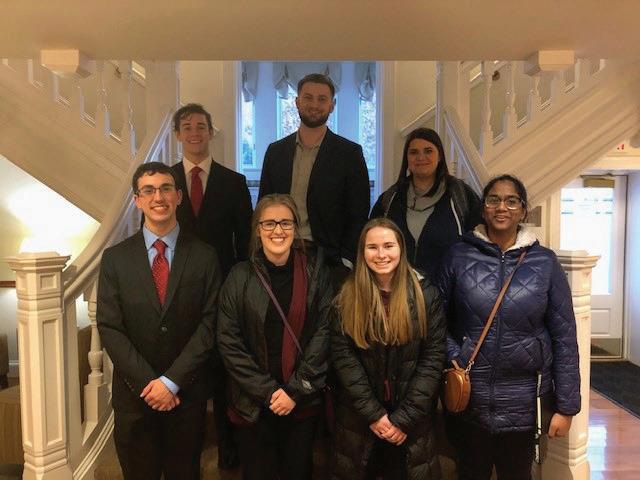
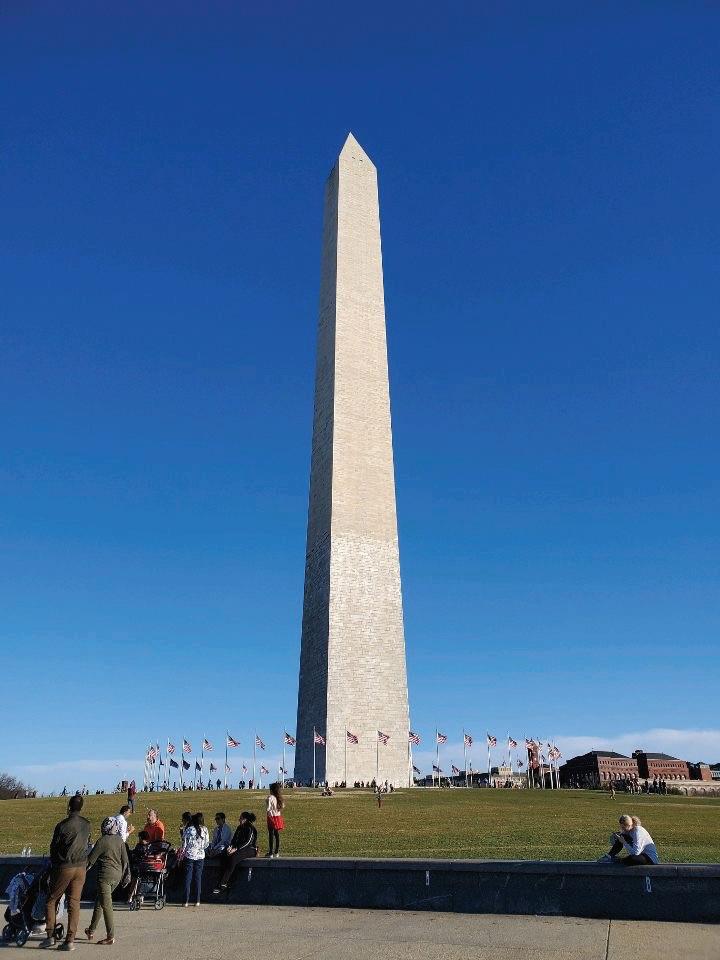
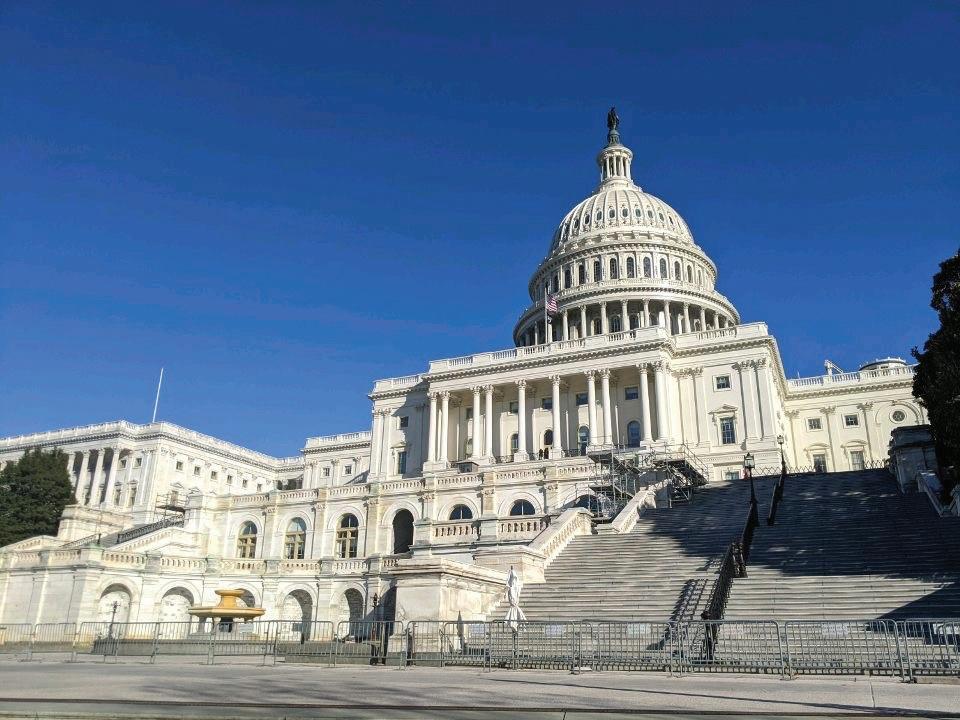
Griffin Endowed Chairs
The following individuals have served as the Robert and Marjorie Griffin Endowed Chairs in American Government at Central Michigan University:
Craig Ruff (2000-2003)
William Ballenger (2003-2007)
Gary Peters (2007-2008)
Maxine Berman (2009-2013)
Gary Randall (2013-2017)
David Rutledge (2017-Present)
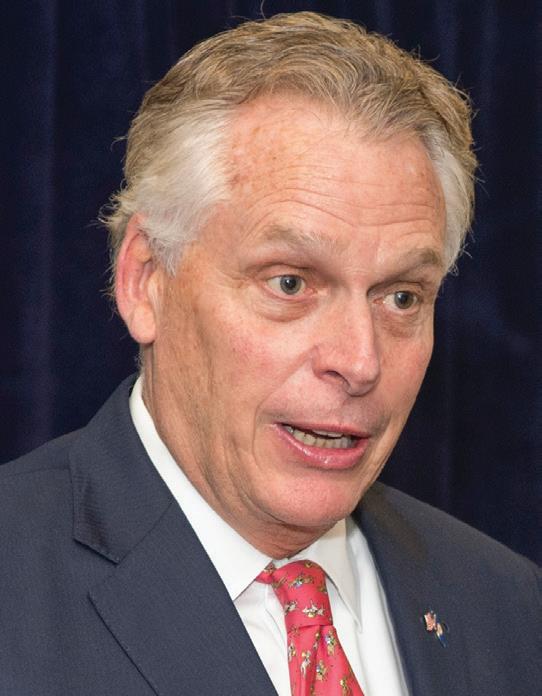
2 Spring 2020 | The
Griffin
The
Griffin
Terry McAuliffe (Photo credit: DoD photo by Navy Mass Communication Specialist 1st Class Kathryn E. Holm)
From the Editor Inside Washington 2020 Academic Seminar
I had the esteemed privilege of serving as the faculty leader for eight CMU students for two weeks (January 5-18, 2020) of intensive academic study at The Washington Center for Internships and Academic Seminars (TWC) located in Washington D.C.
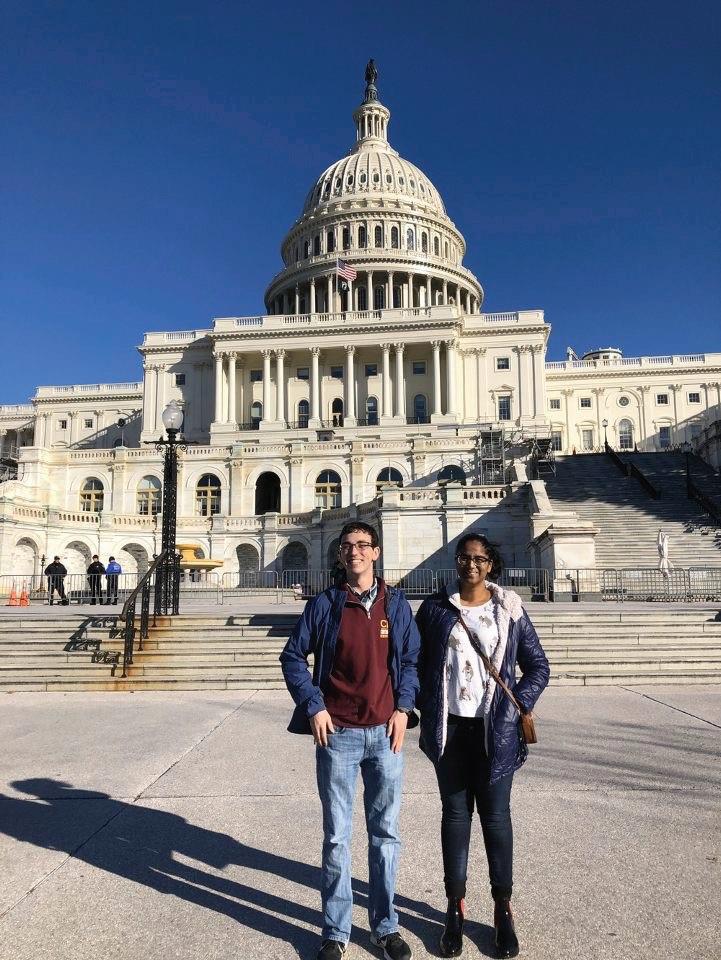
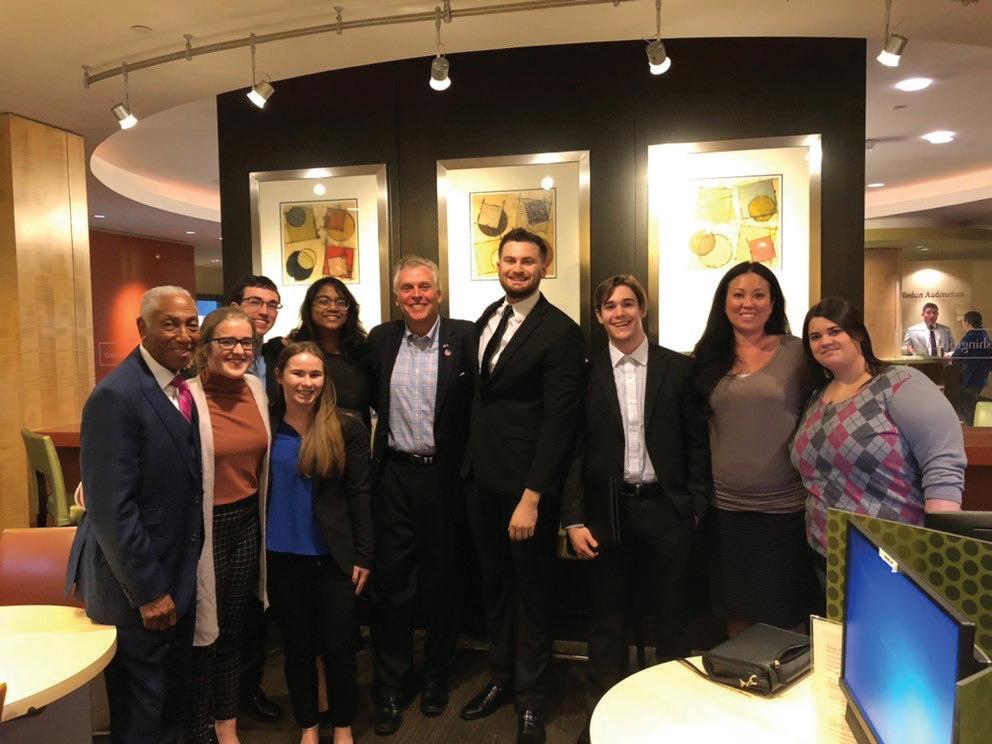
TWC provided an in-depth view of the current political landscape from the perspective of a diverse group of expert speakers representing a variety of professional fields. In addition to several visits to the House of Representatives and the Senate during the impeachment process, the students were also provided the opportunity to visit and ask questions of leaders of influential advocacy organizations. Some of these organizations included General Electric’s Global Affairs Office, U.S. News and World Report, The European Union, Freedom Works, and The Baptist Joint Committee for Religious Liberty. The visits provided insights about the
challenges they face in explaining political issues to their audiences.
The student learning outcomes for these sets of experiences were to increase knowledge base, intellectual skills, and civic and professional engagement. As outlined by the TWC’s Syllabus, students upon completion of the seminar were expected to:
• Display a thorough knowledge of both the formal and informal dimensions of the American political process, including the role of advocacy.
• Identify and evaluate the soundness and relevance of evidence from a variety of sources.
• Analyze political events, issues and processes in light of relevant evidence and theories.
• Demonstrate an understanding of a diversity of perspectives or positions on a contested issue in the American political arena.
These eight CMU students performed all requirements with an outstanding display of vigor and academic excellence. Our day started at 8:30 a.m. and didn’t usually end until 8 p.m. The students were required to write five papers about a discussion topic during the two weeks, plus a capstone project at the end of the seminar experience. I would like to express my sincere admiration to the CMU instructors who had these students in their classrooms and prepared them academically. They represented the university meritoriously.
In this issue of The Griffin, we are highlighting some of the written work of these eight students.
David E. Rutledge, Griffin Chair
The Griffin | Spring 2020 3
CMU students meet with Terry McAuliffe, the former governor of Virginia, during their two-week program in Washington D.C.
Bob Schellhas, CMU’s Guardian Angel for Washington D.C. Internships
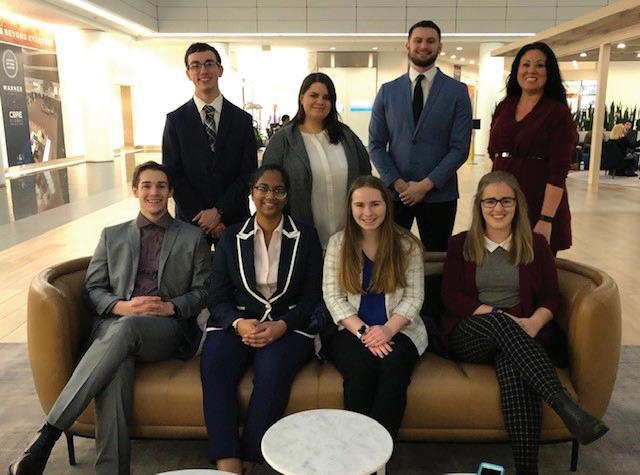
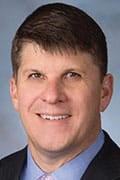 By Sharon Kukla-Acevedo, Associate Professor in the Department of Political Science and Public Administration
By Sharon Kukla-Acevedo, Associate Professor in the Department of Political Science and Public Administration
During the past year, record numbers of CMU Political Science, Public/Nonprofit Administration, International Relations, Economics, and Women and Gender Studies students immersed themselves in the high-impact political environment of Washington, D.C. Seventeen CMU students hailing from Grayling to metro Detroit engaged directly with 7 nationally-prominent politicos (including former Secretary of State John Kerry), 16 distinguished think tanks, 15 highprofile media groups, 6 government agencies, and 4 nonprofit/advocacy groups. The students saw first-hand the inner workings of the U.S. Government by visiting more than 30 government agencies, embassies, think tanks, and much more!
These unparalleled educational activities became more financially accessible to CMU students through support from CMU Political Science
alumnus Bob Schellhas, who has lived and worked in Washington for more than 30 years. Bob has a distinguished career, holding senior positions for U.S. Congressional leaders and heading U.S. government affairs for a global financial institution. Working inside and outside of government he was part of teams that developed legislative responses to the 9/11 terrorist attacks and the 2008 financial crisis, and, played key roles in federal policy related to student lending and retirement savings. Bob is currently a U.S. government affairs consultant for clients of the accounting firm Ernst & Young LLP.
“I will never forget my first visit to the nation’s capital,” said Schellhas, who is from Clare, Mich., and was a commuter student while attending CMU. “The experience was inspirational, helped focus my career path and changed my life.”
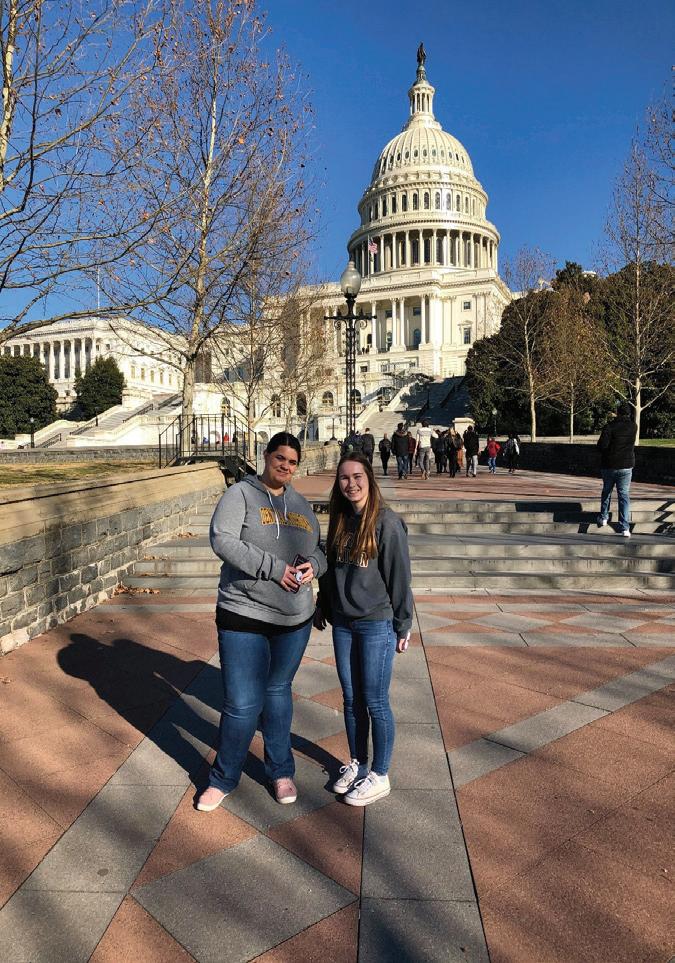 Bob Schellhas
Bob Schellhas
Bob wants to promote access to Washington, D.C. among CMU students who may also be inspired by the idea of a career in Washington in either the public or private sector. Student beneficiaries note that their experience helped them achieve “lifelong goals” and these opportunities “would not have been possible” without Schellhas’ support.
Sharon Kukla-Acevedo is an associate professor in the Department of Political Science and Public Administration and Internship Director at CMU.
4 Spring 2020 | The Griffin
Governing With Vision
By David Rutledge, the Robert and Marjorie Griffin Endowed Chair in American Government at CMU
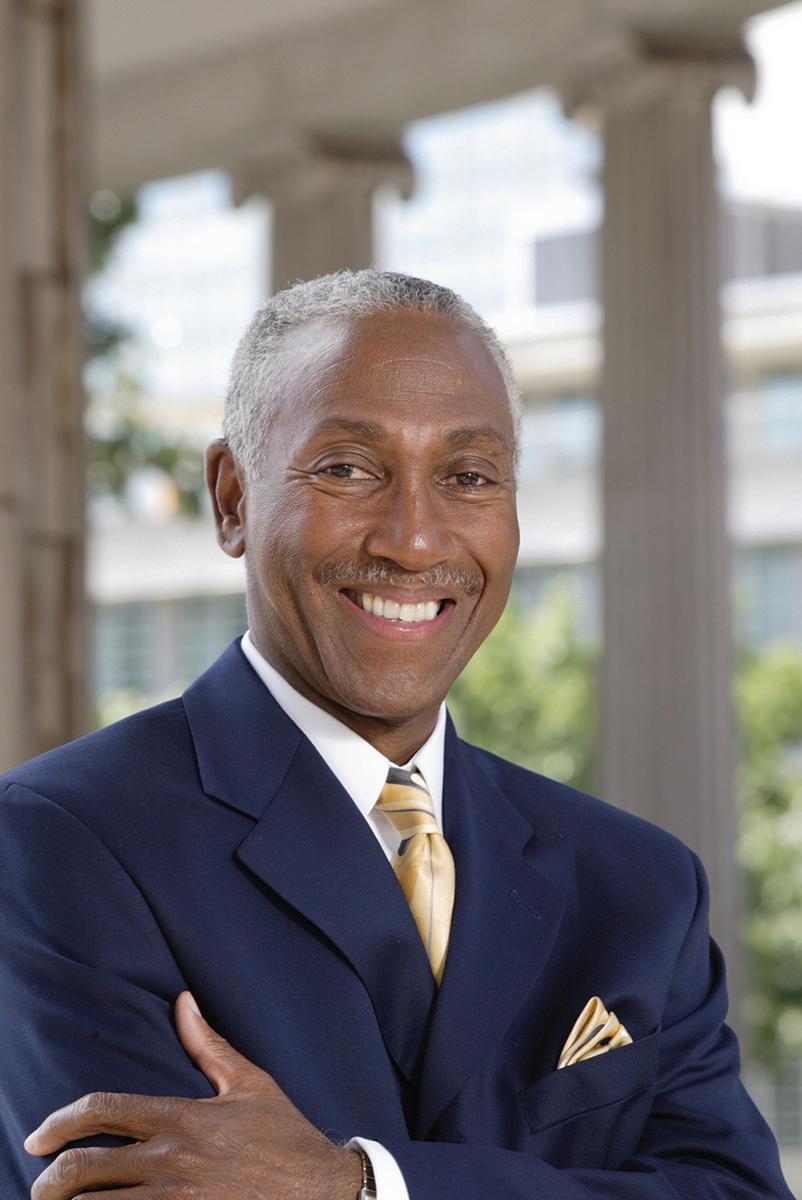
I recently had the opportunity to attend Central Michigan University’s Board of Trustees Meeting. The board consists of eight members appointed by the governor with the consent of the Senate. The decisions made at that meeting got me thinking about the awesome responsibility of university trustees. They are the governing and policy-making arm of the university. One of their most important tasks is to hire the person that manages the daily operations of the institution—the president or CEO.
A major challenge for governing boards is to establish and uphold a vision and mission that clearly reflects the expectations of students, staff, and the communities they serve. Meeting that challenge can be difficult if the future is not anticipated. An example of one of those challenges is the looming peril of continued higher education enrollment decreases nationwide. Did we see this future coming?
How do university governing boards plan for their future without knowing what the future will be? Is wizardry somehow involved? Those who claim to have the ability to see the future, i.e., fortune tellers, palm readers, and tarot readers are viewed by most with a healthy dose of skepticism. However, if institutions of higher learning are to be effective and high performing, they must have visionary leadership at the very top of the organization. That means trustees and the CEO’s they hire should have a forward-looking perspective. Neither governing boards nor university presidents can predict the future; no one can. However, if trustees work as a team, think strategically, and implement clear policies that provide institutional guidance, CEO’s will be armed with the requisite tools to focus their planning efforts in a forward direction. Additionally, they are more able to effectively manage their time directing staff, engaging community leaders, business groups, and others in order to learn and understand evolving issues that may impact the university and its future.
Successful presidents have developed the ability to exist in the present and future simultaneously. It’s not their ability to predict future events that bring the future into view; it’s their ability to absorb and analyze data gathered by communicating and listening to diverse groups. That process most often will reveal clues to crafting and recommending board responses to future events that could hold important opportunities for the institution. The authors of The Visionary’s Handbook point out that “events are the given even though we have no way of knowing what the events will be. What isn’t the given is how we react to unknowable and unpredictable events as they arrive.
It’s the response, not the events that determine both our future and our satisfaction in the present with the future we expect.” (Wacker, Taylor and Means. The Visionary’s Handbook. New York: Harper-Collins, 2000, p.6)
The determining factor in whether institutions realize success in their futures is usually dependent on how well the CEO does getting their board to proactively embrace recommended responses to anticipated future events. In its December 2019 report on the outlook of the U.S. higher education sector, Moody’s Investors’ Service made the following observation:
“Governance will remain a key differentiator among higher education institutions. Those that are able to identify their strengths and weaknesses and take appropriate action where necessary will fare better than those that remain reactive.” (Source: “Higher education – US: 2020 outlook moves to stable with steady revenue growth and solid reserves,” at: http://www.moodys.com/ researchdocumentcontentpage. aspx?docid=PBM_1199135.)
When universities suffer, it is usually because the various components of the institution, including the board, have not been encouraged or agreed to look beyond the present and develop a shared set of goals that embrace opportunities presented by events of a constantly changing environment.
The Griffin | Spring 2020 5
David Rutledge
Christina Yunan Wins Maxine Berman Award
Maxine Berman was a distinguished public servant who served in the Michigan House of Representatives from 1983 to 1996. She was on Central Michigan University’s faculty as the Griffin Endowed Chair in American Government from 2009 to 2013 and elected to the Michigan Women’s Hall of Fame in 2015. Maxine Berman was 71 when she passed on March 2, 2018.
To honor her legacy, the Department of Political Science and Public Administration established the Maxine Berman Academic Achievement Award in 2018. The award is presented to a student doing course work in political science who exhibits academic excellence, a strong interest in social justice, and a passion for public service.
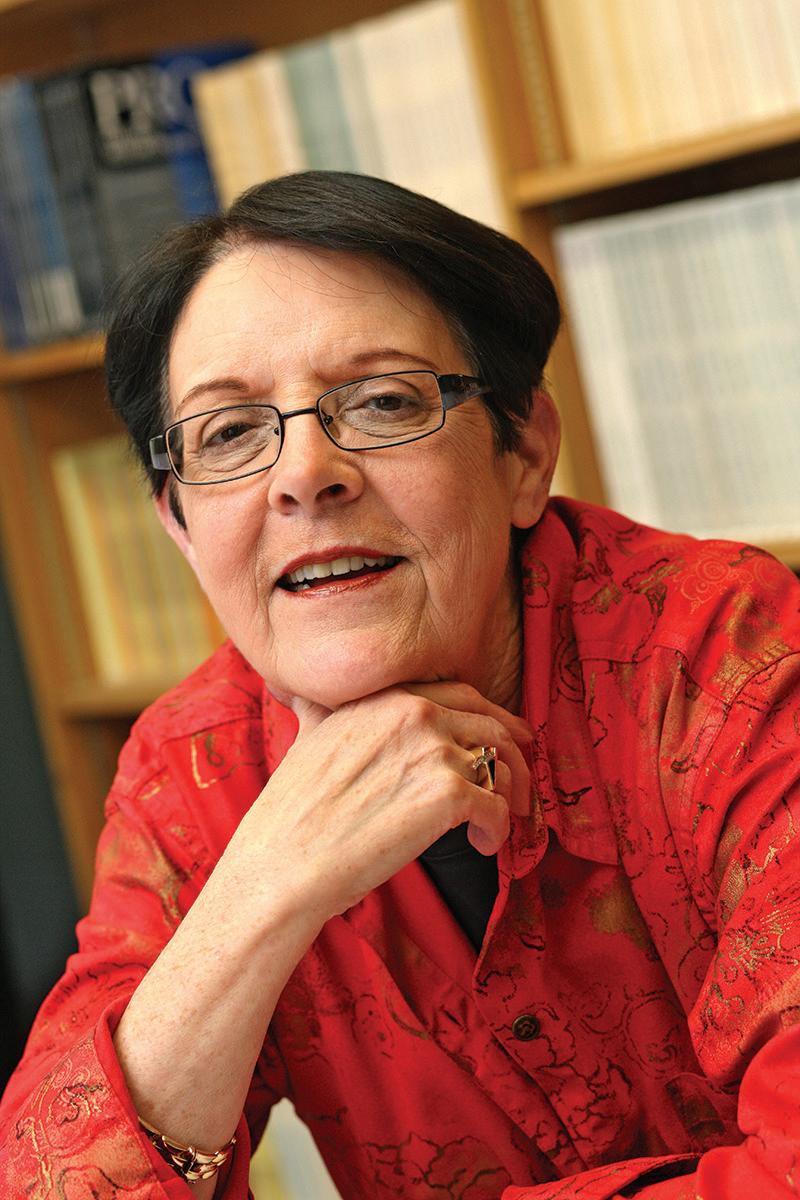
CHRISTINA YUNAN is the recipient of the 2019 Maxine Berman Achievement Award. Her faculty nomination letter stated: “Yunan brings together the academics, the deep interest in the political process through public service, and a passion for community service.”
Christina is a senior majoring in political science with double minors in sociology and legal studies. She’s also getting certificates in lawmaking and legal processes and cultural competency.
Christina is the president of Phi Alpha Delta Pre-Law Fraternity International and is also the legal clinic director for the Student Government Association’s Pro-Bono Legal Clinic. Christina is a
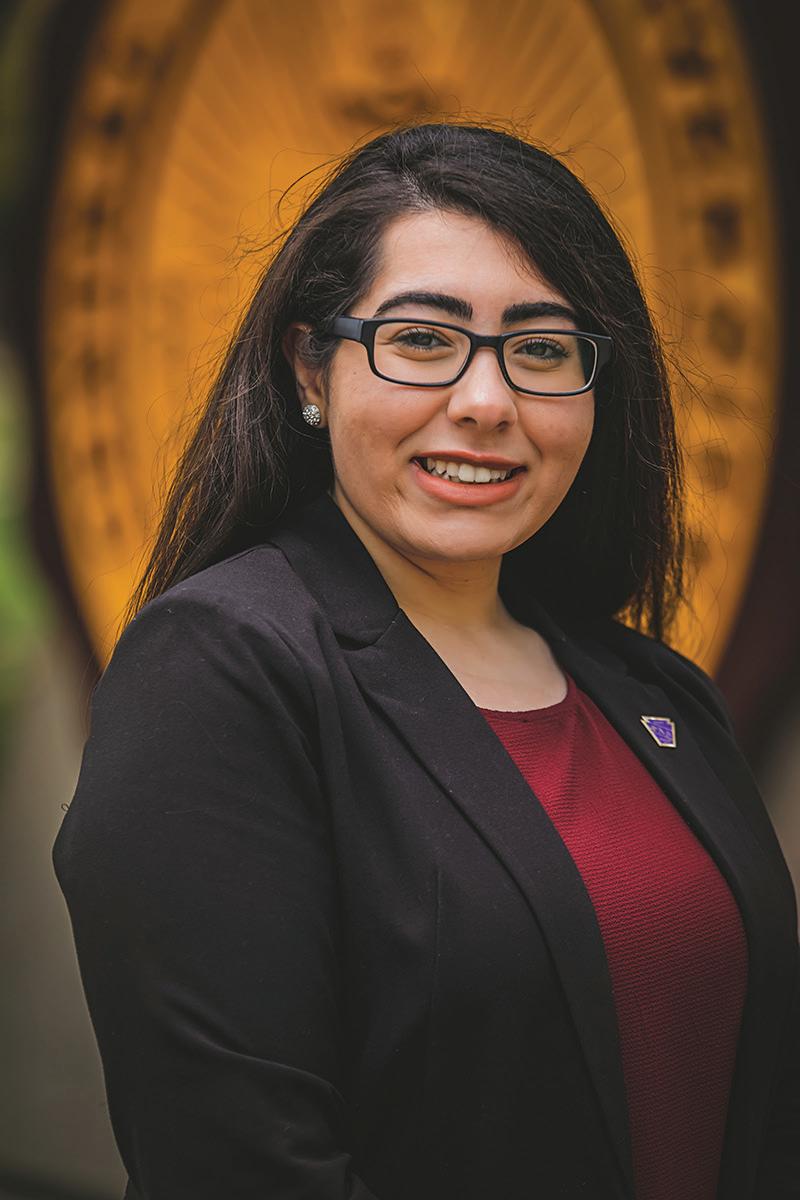
member of the National Political Science Honor Society and a co-founder of the Chaldean-American Student Association. She plans to attend law school, practice law, and run for public office at some point in her future. Christina says that her main goal in life is “to be a voice for the voiceless, a fighter for the unable, and an advocate for the less fortunate.”
CONGRATULATIONS TO THE 2019 MAXINE
BERMAN SCHOLARSHIP AWARD WINNER, CHRISTINA YUNAN.
Maxine Berman Scholarship Information:
• The Award recognizes the academic accomplishments and promise of a student enrolled in one or both of the seminar courses taught by the Griffin Chair (PSC 300/301).
• Recipients will embody the qualities epitomized by Maxine Berman’s long public service to Michigan and reflect her concerns for social justice.
• Minimum GPA of 3.00 on a 4.0 scale.
• The award will be made only if highly qualified applicants apply.
• Nominations are made by the Griffin Chair and, if there are multiple nominees, recipients are selected by the Department of Political Science and Public Administration.
Questions should be addressed to David Jesuit at 989-774-2795 or David.Jesuit@cmich.edu.
Favorite quote selected by Ethan Petzold, PSC 300 student
“But the thing that got me through that moment, and any other time that I’ve felt stuck, is to remind myself that it’s about the work. Because if you’re worrying about yourself—if you’re thinking: ‘Am I succeeding? Am I in the right position? Am I being appreciated?’—then you’re going to end up feeling frustrated and stuck. But if you can keep it about the work, you’ll always have a path. There’s always something to be done.” – Barack Obama
6 Spring 2020 | The Griffin
Christina Yunan
Maxine Berman
April 17, 1946 - March 2, 2018
Search Process Timeline for New Griffin Endowed Chair in American Government
By David Jesuit, Chair of the Department of Political Science and Public Administration
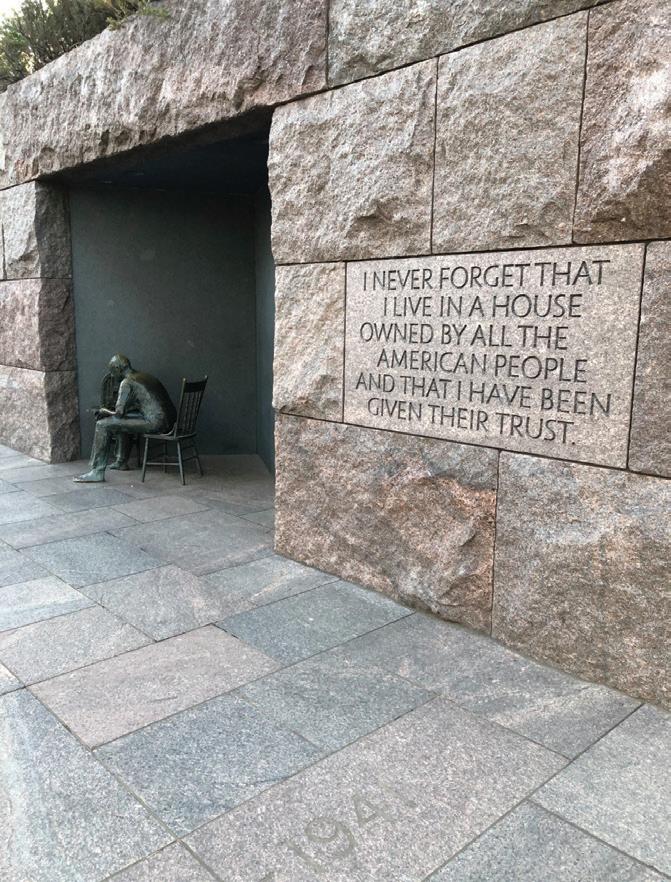
The Honorable David Rutledge is currently serving the third year of his four-year term as the Robert and Marjorie Griffin Endowed Chair in American Government. Dr. David Jesuit, Chair of the Department of Political Science & Public Administration, recently announced that the search for Professor Rutledge’s replacement will begin in the next academic year. The anticipated process schedule is outlined below. However, the university reserves the right to make some modifications as necessary.
• October 2020: Vice president for Development and Alumni Relations verifies that the funding level meets the CMU Board of Trustees guidelines.
• November 2020: Departmental or college search committee is appointed by the CLASS dean and approved by the provost and will include a member of an appropriate advisory board. (The Griffin Advisory Board consists of the former and current Griffin Chairs, which now totals five individuals).
• December 2020/January 2021: Search committee search procedures, including the process of selecting nominees, are approved by the dean and the provost. The dean and search committee approve advertisement/position description, criteria to be used in selection, and standard university language.
• January 2021: Search committee begins “quiet” search for applicants. Potential nominees shall be recommended by faculty, senior officers, members of the Board of Trustees and members of the Griffin Advisory Board.
• March 2021: Departmental or college search committee recommends semi-finalists to the dean. The Griffin Advisory Board, which will includes a CMU Board of Trustees member for this purpose, is consulted for feedback on potential semi-finalists and provides feedback to the search committee and dean.
• April 2021: Dean informs the provost of semi-finalists and seeks feedback. Provost informs the president of semi-finalists. Dean approves semi-finalists. Search Committee conducts on-campus interviews of semi-finalists. Search Committee recommends finalist to dean. The dean forwards the recommendation to the provost. The provost and president grant final approval.
• May/June 2021: President informs Board of Trustees. University announces the appointment.
The Department of Political Science and Public Administration is committed to maintaining the integrity of the search process and helping identify the best possible candidate for the next Chair.
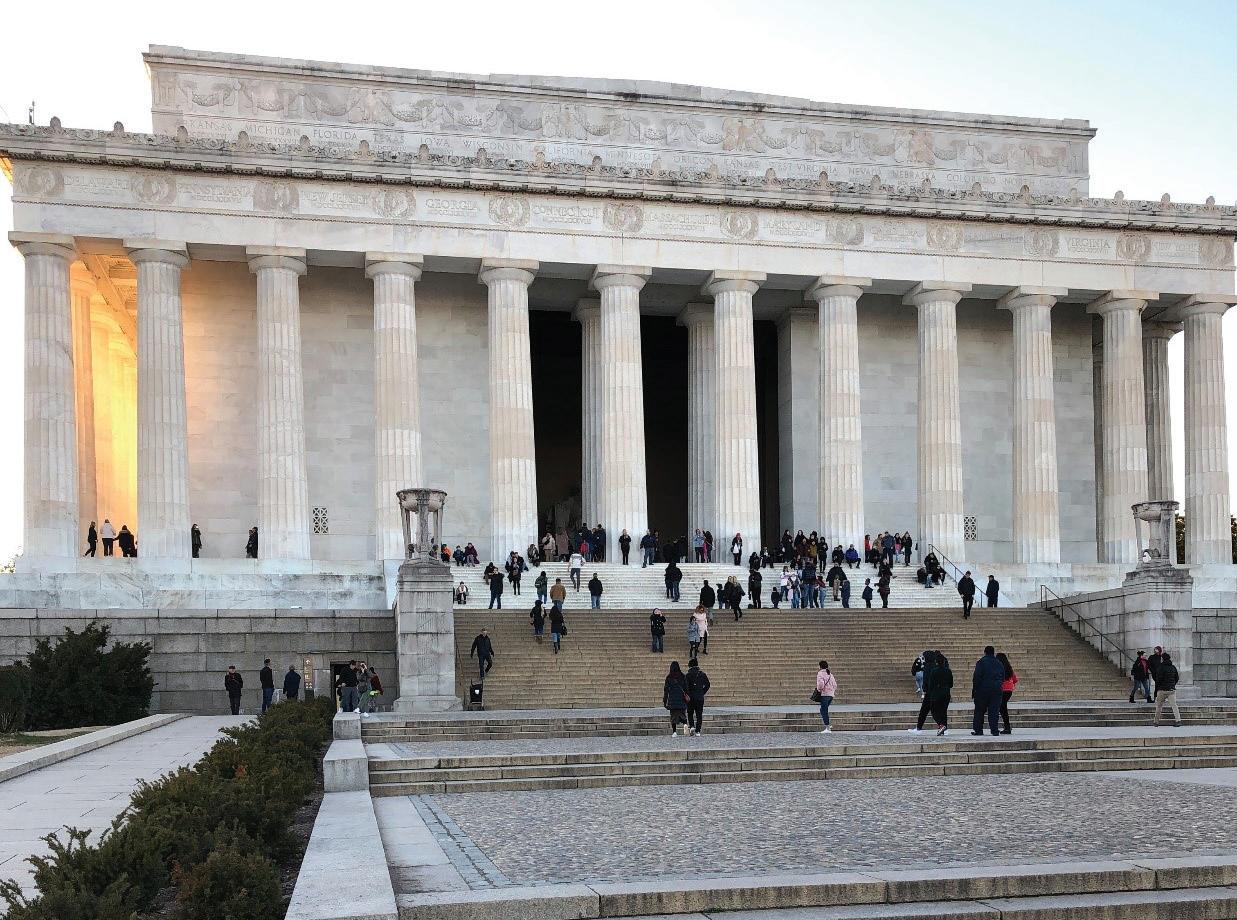
The Griffin | Spring 2020 7
Special Thanks to our Guest Speakers
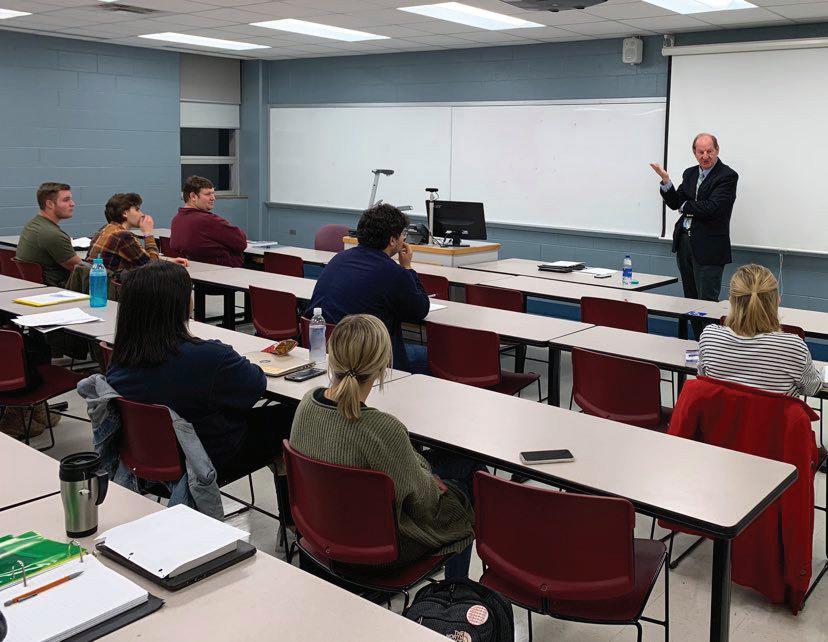
Jennifer Smeltzer is a graduate of the Women’s Campaign School at Yale University. Currently, Ms. Smeltzer is the Legislative Director at the Michigan State Senate. Ms. Smeltzer has significant experience as a Campaign Director and is the owner of CCS Campaign Solutions. When visiting the students enrolled in PSC 300, Ms. Smeltzer outlined how to successfully organize and execute an effective campaign plan.
Rusty Hills is a Lecturer at the Gerald R. Ford School of Public Policy at the University of Michigan. Prior to this, he served as Attorney General Bill Schuette’s Director of Public Affairs. Mr. Hills also served as the Chair of the Michigan Republican Party. Mr. Hills discussed his experiences with campaigns, elections, public affairs and communications, and serving as a politician to the PSC 300 class.
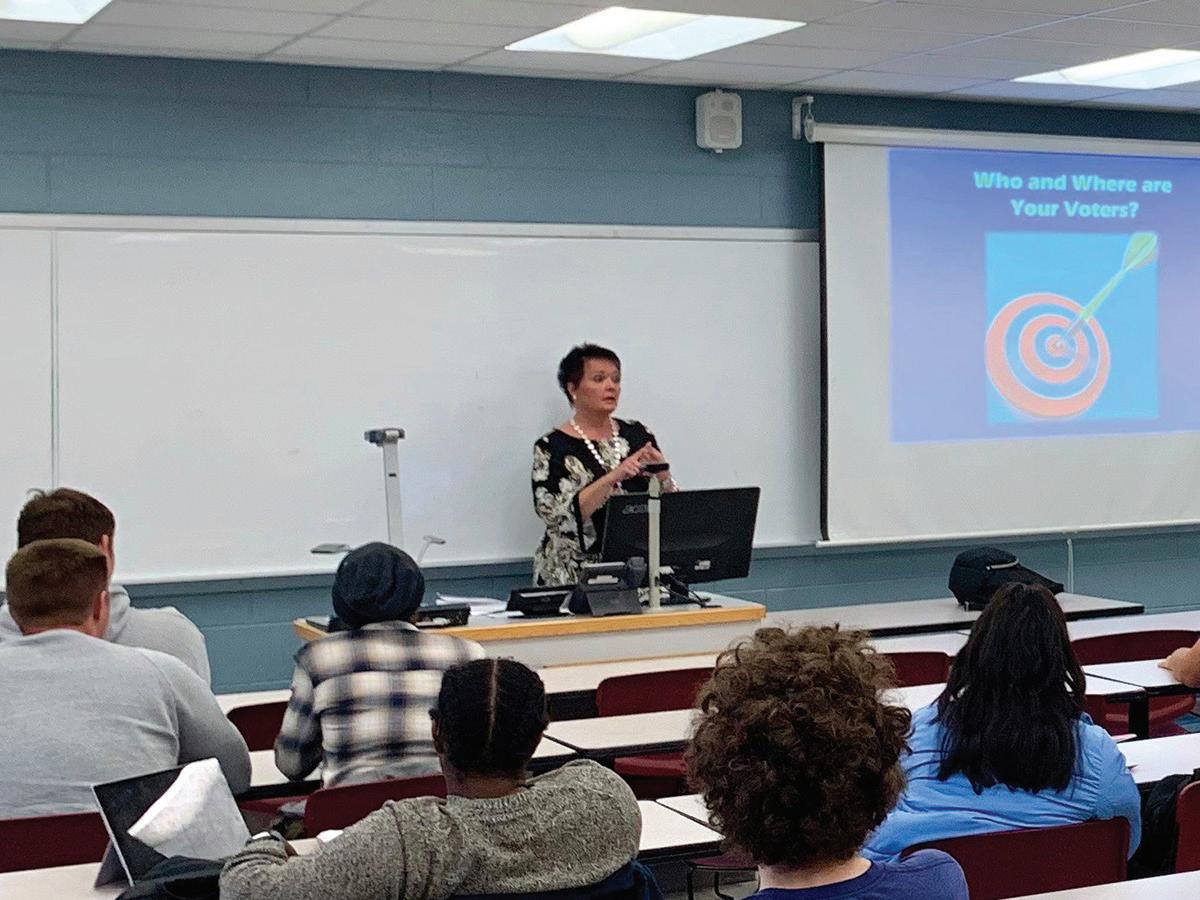
8 Spring 2020 | The Griffin
Each semester the Griffin Endowed Chair hosts guest speakers to meet with students taking the Griffin seminar courses.
Jennifer Smeltzer
Rusty Hills
Margaret O’Brien is the Secretary of the Senate. Prior to this role, Ms. O’Brien was a member of the Michigan House of Representatives and the Michigan State Senate. Ms. O’Brien spoke to the PSC 300 class about her unique experiences in these roles. She showed students her ads, pieces of literature, and speeches that she used in her campaigns.
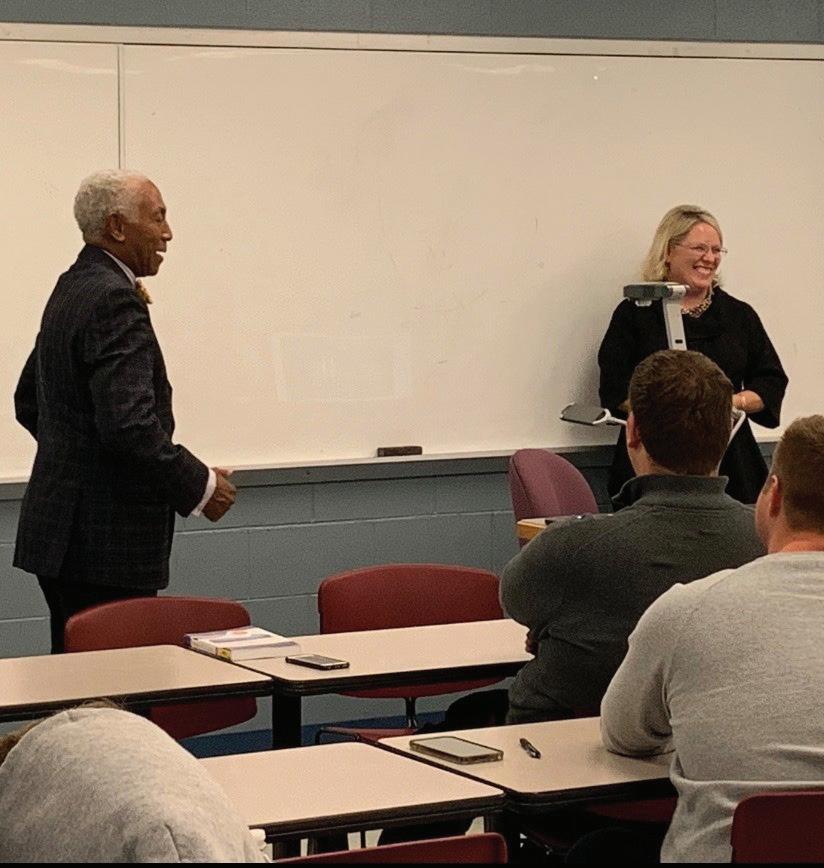
Dan Scripps is a former Michigan State Representative and was appointed by Governor Whitmer to the Michigan Public Service Commission. Mr. Scripps is a law school graduate from the University of Michigan and is an expert in renewable energy. Mr. Scripps took the time to speak to the PSC 300: Michigan Politics and Elections class about his role in the Commission and discussed renewable energy efforts that are taking place in Michigan.
Sheldon Neeley is the current mayor of Flint, Michigan. Mr. Neeley was elected to the House of Representatives in 2014 and represented the 34th District. Mr. Neeley was reelected as State Representative in 2016 and 2018. During his time in the legislature, he served as the Chair of the Legislative Black Caucus. Mr. Neeley visited the PSC 301: Law and Policy in Michigan State Government during the Spring 2020 semester. He shared memories of his time as a State Representative, discussed challenges he faces as a mayor, and offered words of encouragement to future public servants.
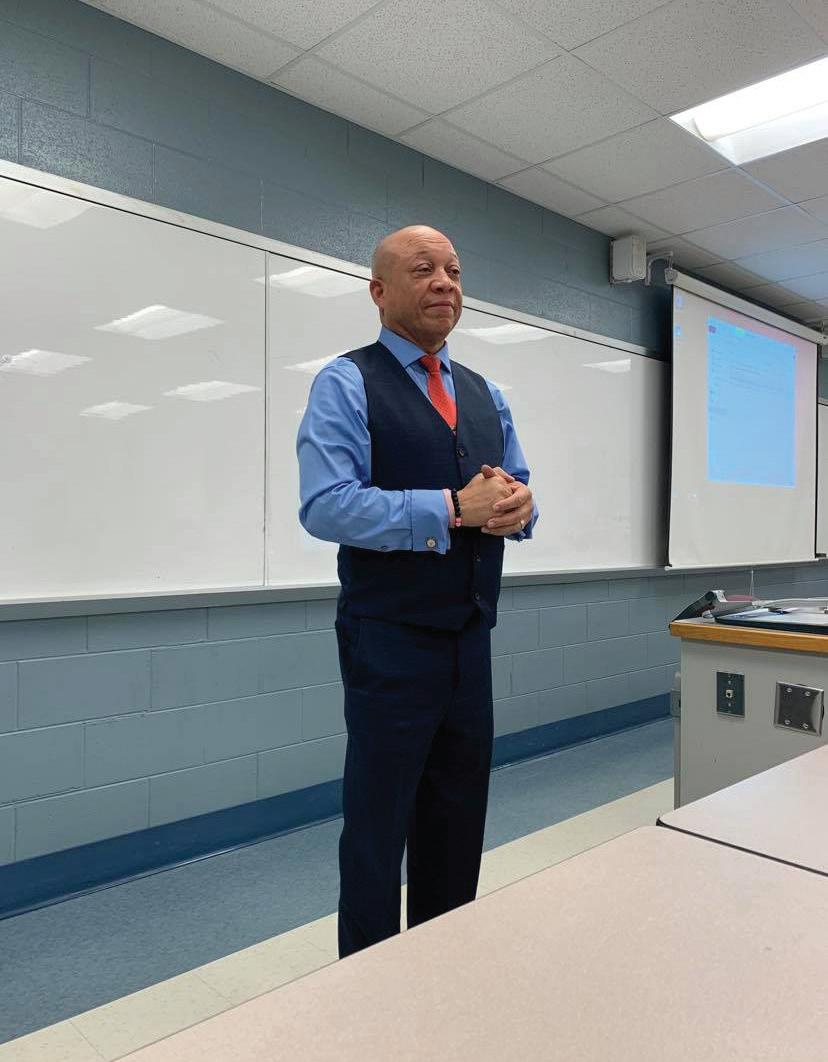
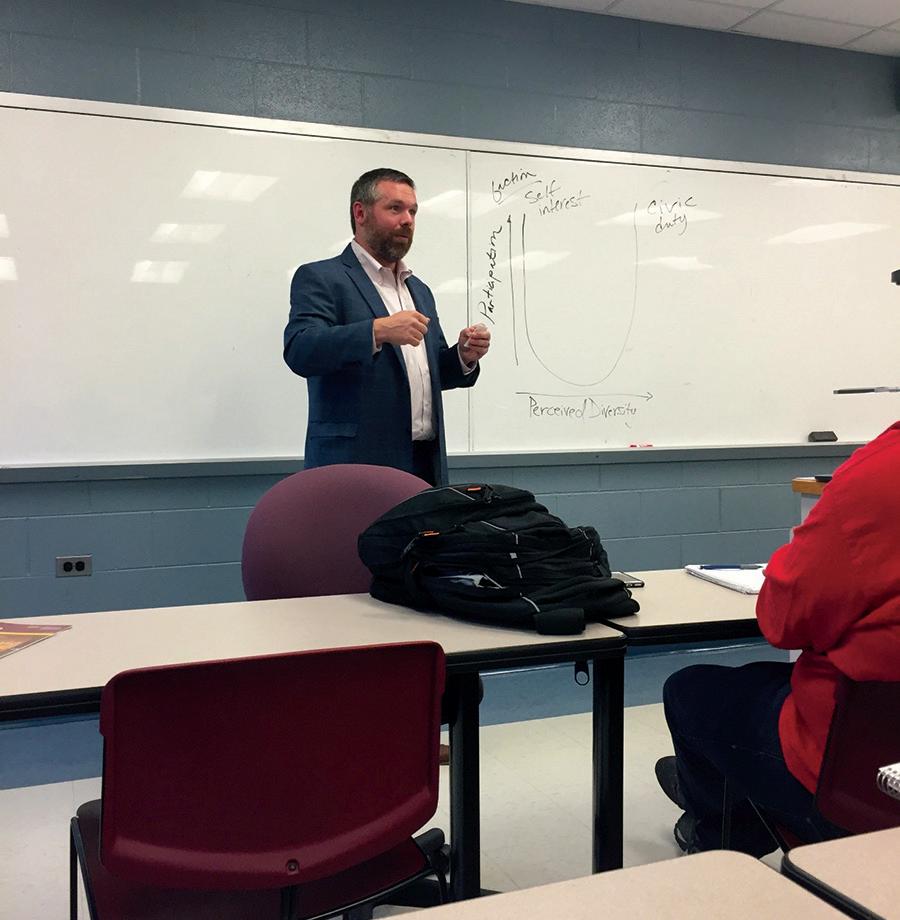
The Griffin | Spring 2020 9
Sheldon Neeley
Margaret O’Brien
Dan Scripps
The Media - Student Paper by Christina Harp
Brian Lamb, former CEO of C-Span, stressed that we should “Follow the money” in regard to where our sources of news information comes from. This is important to keep in mind given the technology age we are in and how fast information is spread. I predict that the expanse of false news from biased media sources will come to a head, but how can that be remedied?
“In 1983, 90% of US media was controlled by 50 companies” (Lutz, 2012). Currently, American media ownership is dominated by five major syndicates. Mr. Lamb made the comparison of two opposing coffee shops in Union Station, directly across from one another, both owned by the same proprietor. When the media is dominated by only five corporations, one must assume that the interests and agendas of those companies will take precedence over others. Biased media presentation takes hold and viewers are subjected to one perfectly cultivated opinion. This distorts the business of politics for those who are not in the thick of it, for those who rely on media outlets to condense information and spoon feed the headlines to their already jam-packed brains. Enforcing unopinionated/unbiased newscasts infringes on First Amendment rights, so what can be done?
I think the average American consumer is underestimated and is starting to realize that the media plays on their ignorance. Trends are moving in a positive direction that we are diversifying our sources of information and digesting data from many sources in order to better formulate personal opinions. The problem lies in the comparison from Mr. Lamb, about the two coffee shops; if you follow the money, are these two opposing businesses still feeding the same source? Are many different media sources still coming from the same point of origin?
References
Lutz, A. (2012, June 14). These 6 Corporations Control 90% Of The Media In America. Retrieved January 7, 2020, from https://www.businessinsider.com.au/ these-6-corporations-control-90-of-the-media-in-america-2012-6.
Lobbyists - Student Paper by
Owen Westbrook
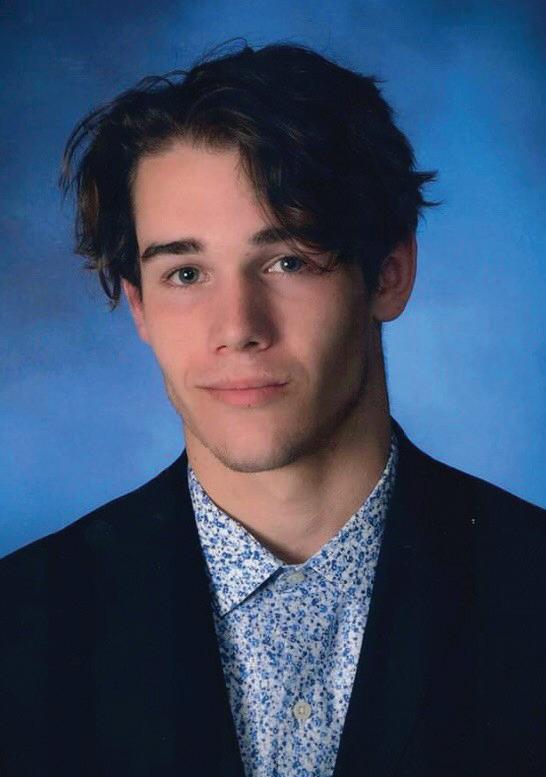
For most of my life, I have gone without the knowledge of exactly what a lobbyist does or even is. Don’t get me wrong, I have definitely heard of lobbyists before, whether it be through political conversation, classes, or even TV, but I have never known the extent of the role they play in our society.

I always was under the assumption that lobbyist were the scum of the earth, after all, that is how they are portrayed in the media. What I learned was far from that of my beliefs, as a matter of fact, what I learned was contradictory to what I was led to believe. While some lobbyists can cause harm to our government due to politicians taking special interest money to sway their votes on issues, for the most part lobbying, is simply a great way to get ideas of a certain large group of people straight to their representatives.
That being said, “Out of the Game or Under the Radar” by Dan Auble says that “between 2007 and 2012 the number of registered lobbyists dropped by 25 percent” (2017). When I saw this I wasn’t exactly concerned, but curious, and that led me to be particularly interested in why.
As the article went on to talk about, a large reason lobbyists are becoming rarer is because Congress can’t get anything done. I couldn’t agree more that this has to be the reason why and I predict that as our politics continue in the same direction they have been headed that lobbyists will become few and far apart. Though this will get rid of these bad special interests in Washington, fewer groups will also be represented. I believe this is very dangerous for the nation.
References
Auble, Dan. “Lobbyists 2012: Out of the Game or Under the Radar?” OpenSecrets News, 27 Jan. 2017, www.opensecrets.org/news/2013/03/lobbyists-2012-outof-the-game-or-u/.
10 Spring 2020 | The Griffin
Christina Harp
Owen Westbrook
The Economy - Student Paper by Mark Sheppard
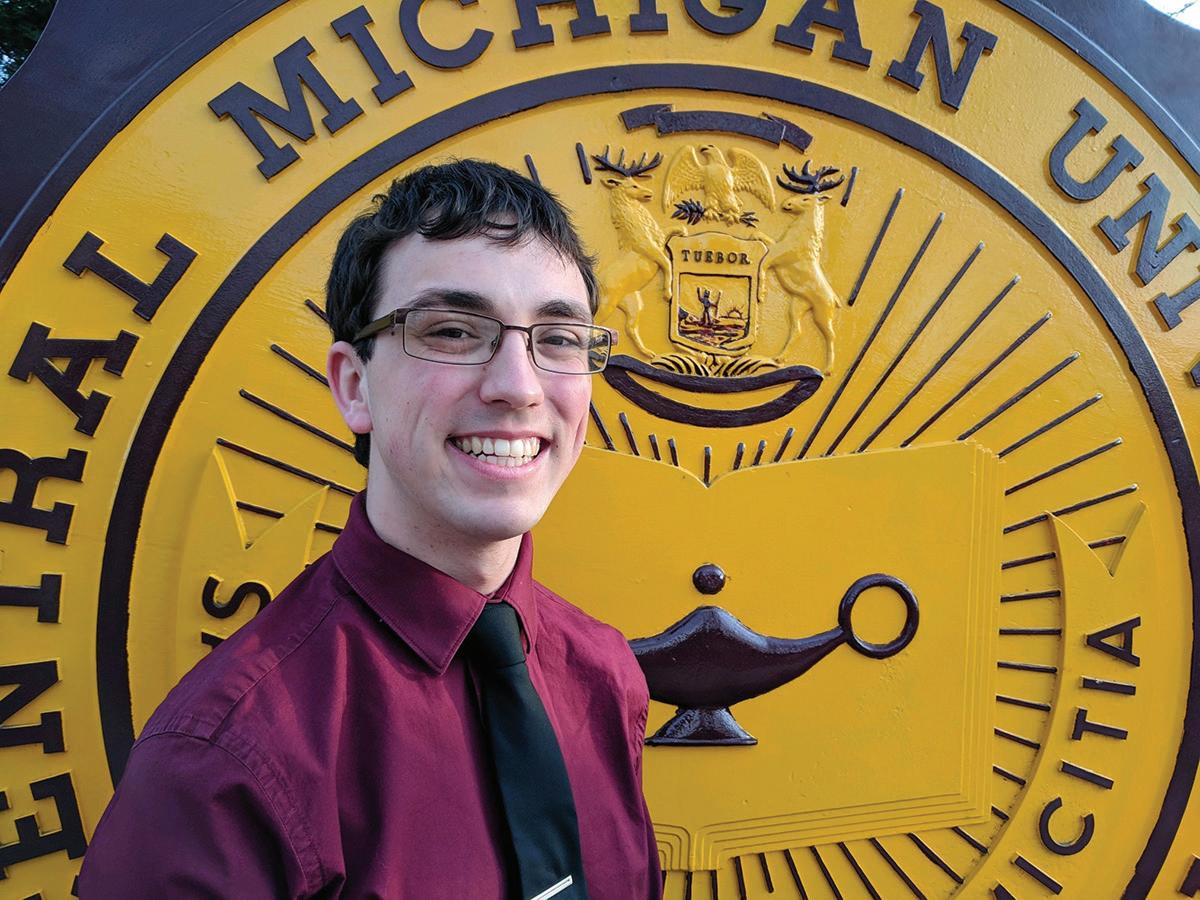
An important topic of the upcoming year is the economy. Fears of a future recession, low wage growth, and very low unemployment all define the current economy. Different measurements conflict on whether the economy is in a great or dangerous position, but the true test of the economy will be the opinions of voters in 2020.
The economy is doing “damn good” and unemployment is “essentially zero,” but wage growth is very weak (Reines, 2020). Companies are making large profits, but workers are not seeing the benefits. Alexandria Ocasio-Cortez calls this “inequality in a nutshell” (2020). The Economic Policy Institute claims current monetary policy seeks to continue economic growth by reducing inflation to help business, but this could lead to continued wage stagnation. The Economic Policy Institute continued, fears of the growing economy failing, like in 2008, haunt the present, and monetary policy seems to be forgetting normal people (2019).
CNBC’s Jeff Cox stated unemployment is at a 50-year low and wages are rising at a crawling pace (2019). The wage growth is still being affected by the recession that happened ten years ago (Economic Policy Institute, 2019), and the cost of living is outpacing wages (Paul & Fottrell, 2019). Wages to cost of living as a metric is easy for voters to feel because as the disparity grows, they must stretch each dollar further. Considering inflation, between the end of 2017 and the end of 2019, real wages declined by 1.3% (Paul & Fottrell, 2019). Strong companies are important to a strong economy, and companies have the potential to raise wages if they feel secure. The current administration will boast this and attempt to get reelected on the strong DOW and NASDAQ. However, voters in 2020 may ignore the strong business climate and vote based on how the economy works or fails for them.
References
Cox, J. (2019). That 50-year low in unemployment isn’t helping worker paychecks. CNBC. Retrieved from https://www.cnbc.com/2019/10/07/that-50-year-lowin-unemployment-isnt-helping-worker-paychecks.html
Nominal wage tracker. (2019). Economic Policy Institute. Retrieved from https://www.epi.org/nominal-wage-tracker/ Ocasio-Cortez, A. [@AOC]. (2020, January 11). The Dow soars, wages don’t. Inequality in a nutshell. [Tweet]. Retrieved from https://twitter.com/AOC/ status/1216157271924924416
Paul, K. & Fottrell, Q. (2019). The no. 1 reason you’re still broke even if you received a pay raise last year. MarketWatch. Retrieved from https://www. marketwatch.com/story/despite-wage-growth-the-average-american-suffers-as-cost-of-living-rises-at-a-faster-pace-2019-01-10
Reines, P. (2020). What Happened? Lessons for 2020 from 2016 campaign. Inside Washington 2020. [Presentation].
Favorite quote selected by
“I never considered a difference of opinion in politics, religion, or philosophy, as cause for withdrawing from a friend.”
– Thomas Jefferson
The Griffin | Spring 2020 11
Mark Sheppard
Favorite quote selected by Lauren Creighton, PSC 300 student
Spencer Hall, PSC 300 student
“Change will not come if we wait for some other person or some other time. We are the ones we’ve been waiting for. We are the change that we seek.” – Barack Obama
Gun Control - Student Paper by Melissa Remijan
Gun control is a hot button issue and it often appears to be extremely polarized, with both sides of the aisle with polar opposite goals and desires. However, this may be due to propaganda poised by special interest groups like the NRA; in reality, Republicans, Democrats, and the general public are a lot closer on the issue than expected.
Nathaniel Rakich (2019) reports that while the topic seems to be at an unshakable stalemate, the public opinion on gun control is not static and tends to ebb and flow in response to mass shootings. There is a trend that support for tougher gun control does, in fact, rise after a mass shooting only to fall again. However, the data does support that overall the public does increasingly support tougher gun control.
Whether the public generally is more favorable or not in regard to gun control, it does appear that special interest groups have their effect on whether Congress makes moves. Robert Richards (2017) reports that in 2012 only about 24 percent of gun owners were members of the NRA and of that 24 percent, there were significant differences in the political views held. These differences included that they support a national gun registry at about half the rate of other gun owners, 11 percent support a ban on high-capacity magazines, and 7 percent support banning semi-automatic weapons (The Role of Interest Groups and Group Interests on Gun Legislation in the U.S. House, p. 474). Richards also notes that “it is not necessarily the case that all gun owners are anti-gun control. However, depending on how members of Congress perceive gun owner opinion, there may still be attempts at representation of these perceived interests, independent of efforts by organized groups” (2017, p. 474).
References
Rakich, N. (2019). How Views on Gun Control Have Changed in the Last 30 Years. Fivethirtyeight.com. https://fivethirtyeight.com/features/how-views-on-gun-control-have-changed-in-the-last-30-years/ Richards, R. (2017), The Role of Interest Groups and Group Interests on Gun Legislation in the U.S. House. Social Science Quarterly, 98, 471-484. doi:10.1111/ssqu.12424
Favorite quote selected by Dylan Foss, PSC 300 student
“You can make more friends in two months by becoming interested in other people than you can in two years by trying to get other people interested in you.” -Dale Carnegie

Favorite quote selected by Blake Miller, PSC 300 student
“The greatest leader is not necessarily the one who does great things. He is the one that gets the people to do the greatest things.”
– Ronald Reagan
Favorite quote selected by Dan McMurray, PSC 300 student
“Our greatest weakness lies in giving up. The most certain way to succeed is always to try just one more time.” – Thomas Edison
Favorite quote selected by Victoria Keenan, PSC 300 student
“Human felicity is produced not so much by great advances but by small, steady improvements.”
- Benjamin Franklin
12 Spring 2020 | The Griffin
Melissa Remijan
Presidential Power - Student Paper by Mary Miller

During our first day of The Washington Center seminar, Brian Lamb stated that public trust in the U.S. military is much higher than that of Congress. Trust in the former is at 79 percent, while trust in the latter is at a meager 11 percent (Lamb, 2020). The starkly unbalanced trust in these institutions creates the challenge of deciding what to do in a time of turbulent international relations. With the current crisis in Iran, I predict that this imbalance of trust will have negative effects on the current political climate.
With high trust in the United States military, I believe that it will be easy for both the U.S. Executive Branch (i.e., the President) and the military to justify any strikes that they make against Iran. While the President does not have the power to declare war on a foreign country, the War Powers Resolution of 1973 states that one of the circumstances in which a president can order military action without the consent of Congress is when there “is a national emergency ‘created by an attack upon the United States, its territories or possessions, or its armed forces’” (Welna, 2020). The Resolution is unclear on the notice that the President has to give to Congress both before and after troops are used; as well, the Resolution makes it very difficult to enforce its constraints. With this, this leaves room for the military, with the President, to justify their recent actions in Iran and convince the public to support said actions. With such a high level of support, further actions against Iran can be hypothetically taken by the military with the support of the public.
In contrast, these actions and the fact that it is difficult for Congress to hold the military and the president accountable for their violation of the Resolution, mean that they will continue to abuse these powers. Without these important checks and balances, the political polarization will continue to grow and, I believe, the American people will continue to lose faith in the legislative system. If they cannot properly enforce this Resolution, then what faith is there to have that they can enforce any other resolution or laws put before them? The American people see the actions of the military every day; while many may not understand the ramifications of those actions, they can see that something is being done.
The voter turnout in the United States was 53.4 percent in the 2018 election (Misra, 2019). The upcoming year is an election year for all of the members of the House of Representatives, one-third of the senate, and the President. With such little confidence in two of these three institutions already, I believe that the confidence will continue to fall in Congress. However, as the Iran situation continues to escalate, I think that the trust in the military will increase. While there are many in Congress who are vehemently against going to war, knowing that there is such high confidence from the American people in the military makes it difficult to speak out against it. While wanting to balance constitutional duties with re-election, members of Congress have the difficult balance of appealing to potential voters who have faith in the military while also attempting to keep the powers of the military – and the President – in check.
References
Misra, J. (2019, April 23). Voter Turnout Rates Among All Voting Age and Major Racial and Ethnic Groups Were Higher Than in 2014. Retrieved from https://www. census.gov/library/stories/2019/04/behind-2018-united-states-midterm-election-turnout.html
Lamb, B. (2020, Jan. 5) Inside Washington Seminar. Welna, D. (2020, Jan. 7). War Powers Resolution on Iran Is Latest Attempt By Congress to Reclaim Clout. Retrieved from https://www.npr. org/2020/01/07/794334043/war-powers-resolution-on-iran-is-latest-attempt-by-congress-to-reclaim-clout
“There is no limit to the amount of good you can do if you don’t care who gets the credit.” – Ronald Reagan
The Griffin | Spring 2020 13
Mary Miller
Favorite quote selected by Connor Hudson, PSC 300 student
White Supremacy - Student Paper by Parker Neal
White supremacy ideology seems to be increasing in society and, at the very least, seems not to be going away as it should. For hundreds of years, the United States relied on slave labor to provide a stable economy. Slavery in the United States was unique compared to slavery elsewhere in the world. It was the first time in human history that chattel slavery had occurred based on the race of the people who were enslaved. After slavery, there was segregation, which is so recent that there are many people alive today that experienced it firsthand. The dark past of America should be in the rearview mirror; however, white supremacists and white nationalist groups still exist today.
There has been an increase in hate crimes in the United States, with African Americans being the group that is targeted the most. According to David French’s “The WhiteSupremacy Surge,” hate crimes have increased from 2014 to 2018, with a 17 percent increase reported in 2017. I believe this to be because of the internet’s rise and the dawn of social media occurring in the 2010s. Young white males can search for these blogs, posts, and feeds, and, as a result, they can find almost anything they want. This is a huge problem and can cause even further confirmation bias in these young men, which can turn them into mass murderers at worst and closet racists at best.
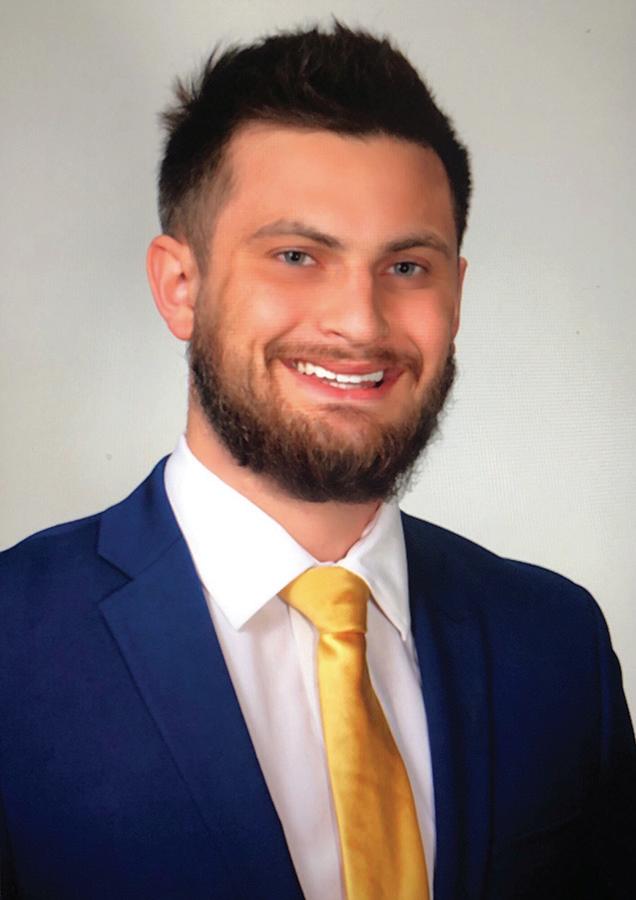
I believe that this country can move forward past racism, but it is going to take legislative procedures to replace inherently racist laws. The American people have taken steps to eliminate slavery and segregation. The next step is to eradicate racism with policies that will limit the spread of the hateful ideology that white supremacy is.
Immigration - Student Paper by Samantha Hayes

Stephanie Hamill said, “She did it the right way.” This comment explained her mother’s process of coming to America. The remark highlights the growing tension surrounding immigration among American citizens. With immigration reform continuing to be ignored, detainment camps have become a short-term solution to a rising problem. Given the current trends, immigration reform will influence the platform of many political candidates.
Since the presidency of George W. Bush, administrations have attempted but failed to implement comprehensive immigration reform. During the Bush presidency, “a conservative revolt…successfully prevent(ed) the passage of comprehensive immigration reform” (Grossman, p.131). Under the leadership of President Obama, Democratic leaders made “agreements with members of the Republican minority in order to pass agenda items” such as “comprehensive immigration reform legislation” (Grossman, p.133). However, the changes made have yet to solve, in the public’s view, the root of the problem. With that, the Trump administration has begun increasing the use of detainment. These actions have only brought more light to the issue of immigration.
The fact that the United States was created by immigrants will cause issues with candidates when discussing immigration reform. To this day, America is filled with lots of immigrants from several different countries across the world. With this in mind, Democrats and Republicans will have to be careful when creating immigration reform plans. In order to win the votes of individuals who are more moderate or left-leaning, Republican candidates will need to take a more liberal position on immigration. Meanwhile, Democrats will need to avoid plans that involve concepts which imply open borders to avoid losing moderates. As the primaries approach and the election comes down to few candidates, immigration reform will be an issue that candidates will need to address.
References
Grossman, M., & Hopkins, D. A. (2015). PDF.
Hamill, Stephanie. Jan 5, 2020. Inside Washington Seminar
14 Spring 2020 | The Griffin
Parker Neal
Samantha Hayes
Foreign Policy - Student Paper by Pravallika Chirumamilla
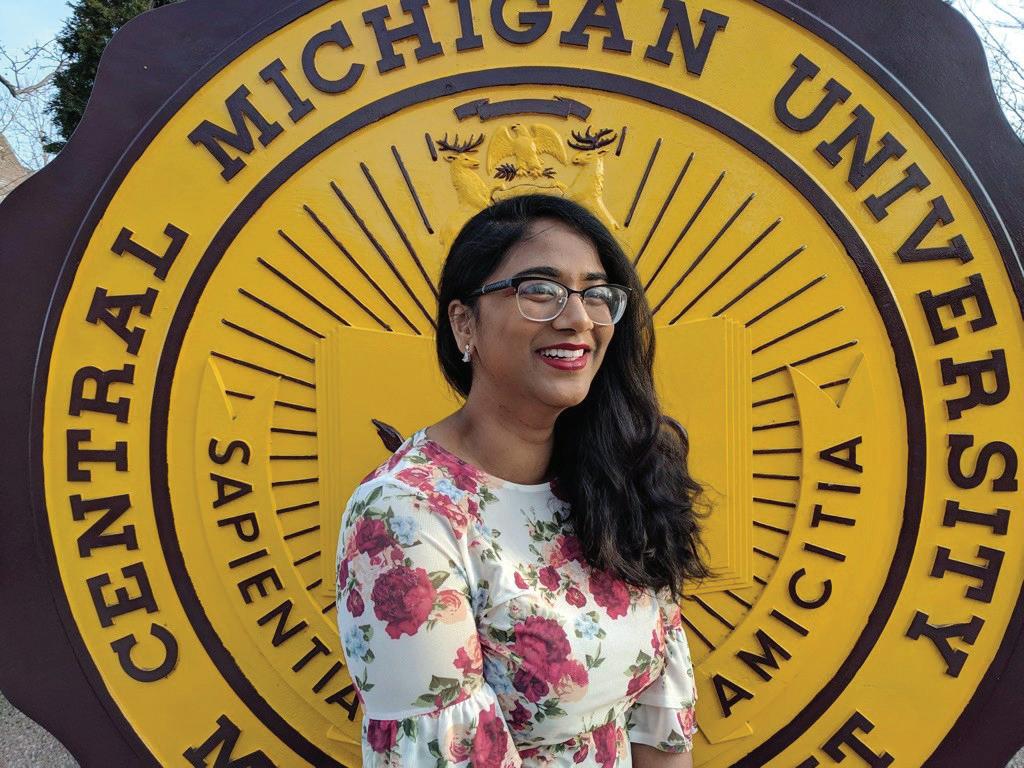
Foreign policy in the United States is defined as how the U.S. acts towards other countries. Over the past four years, the foreign policy under the Trump administration has been one of rolling back the role of the U.S. in previous treaties and agreements, forming a nationalistic and isolated world view. However, even while pushing away from internationalism, the president is not afraid of calling out other nations and international organizations that he finds do not favor the United States’ interests.
From tightening the U.S.-Mexico border to moving the U.S. Embassy in Israel to Jerusalem, the choices that have been made are ones that have been hotly contested by both political parties. Over the next year, the challenges that face the U.S. will be prevalent, as the different presidential candidates debate what role the United States should play in the world, or lack thereof.
According to an official statement from the White House in the article “President Donald J. Trump’s Foreign Policy Puts America First,” President Trump views an effective foreign policy as one that puts “America first” and bolsters its own citizens first. With this approach, he hopes this will project a vision of the United States’ prosperity abroad. Along with strengthening the U.S. border, the Trump administration has withheld funds to various countries and UN programs in an effort to see equal duty placed on other non-Security Council actors in the international realm, as he claims that the U.S. is not being treated fairly in these deals.
In contrast, the five Democratic candidates that qualified for the January debate all have disagreed with Trump on a lot of his views, citing them as extremist and divisive on the world stage. According to a poll conducted by the Associated Press-NORC Center for Public Affairs Research, 63 percent of respondents disagree with Trump’s foreign policy stances; 89 percent of them are Democrats (AP-NORC poll: Most Americans oppose Trump’s foreign policy, 2019). In addition, 53 percent of respondents believe that the U.S. standing in the world in the next year will get worse.
Now with the threat of a war with Iran, the foreign policy of the Trump administration and his Democratic opponents are more important than ever, because it will set the course for the next four years. The division between the parties and their stances on what the United States’ role should be in the international realm is a debate that will either result in an eventual war or a tentative peace.
References
“NORC Poll: Most Americans Oppose Trump’s Foreign Policy.” AP , 28 Jan. 2019, http://www.apnorc.org/news-media/Pages/AP-NORC-poll-Most-Americans-oppose-Trump’s-foreign-policy.aspx.
“President Donald J. Trump’s Foreign Policy Puts America First.” The White House , The United States Government, 30 Jan. 2018, https://www.whitehouse.gov/briefings-statements/president-donald-j-trumps-foreign-policy-puts-america-first/. “Trump’s Foreign Policy Moments.” Council on Foreign Relations, Council on Foreign Relations, https://www.cfr.org/timeline/trumps-foreign-policy-moments.
The Griffin | Spring 2020 15
Pravallika Chirumamilla
Department of Political Science and Public Administration

The
Griffin
247 Anspach Hall
Central Michigan University Mount Pleasant, MI 48859
16 Spring 2020 | The Griffin
 A
for the Robert P. and Marjorie Griffin Endowed Chair in American Government
CMU students visited Washington D.C. in January for two weeks of intensive academic study at the Washington Center for Internships and Academic Seminars (TWC).
A
for the Robert P. and Marjorie Griffin Endowed Chair in American Government
CMU students visited Washington D.C. in January for two weeks of intensive academic study at the Washington Center for Internships and Academic Seminars (TWC).








 By Sharon Kukla-Acevedo, Associate Professor in the Department of Political Science and Public Administration
By Sharon Kukla-Acevedo, Associate Professor in the Department of Political Science and Public Administration
 Bob Schellhas
Bob Schellhas


















